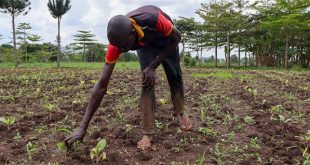
Audit reveals need for honest discussion, greater accountable and sufficient funding
Kampala, Uganda | RONALD MUSOKE | Shining the spotlight on the huge numbers of refugees Uganda hosts peaked in June 2017 with a meeting of world leaders on the shores of Lake Victoria in Kampala that sought to raise US$2 billion (€1.8 billion) in aid towards a humanitarian crisis.
At the time, the crisis over the South Sudanese civil war was threatening to spill out of control and Uganda was said to host about 1.2 million refugees, the majority from South Sudan. So Uganda was supported by the UN to host the refugee solidarity fundraising summit. The UN Secretary General Antonio Guterres and the UN High Commissioner for Refugees, Filippo Grandi attended together with other big names.
By the end of the two day summit, however, only US $358 million was raised while the World Bank and the Africa Development Bank made pledges.
But the anticipated dollars from the refugee summit had an unexpected outcome: They sparked disputes over “who was doing how much work for the refugees and therefore should be getting more.”
A few months after the summit, a whistleblower tipped off donors saying senior government officials in the Office of the Prime Minister were conspiring with staff from the United Nations High Commission for Refugees (UNHCR) and World Food Programme (WFP) to report higher refugee numbers, get more money to support them, and steal the difference between what is received and what is actually spent on the actual smaller number of refugees.
That sounded like a big scandal and the donors led by the European Union, demanded an immediate investigation.
“We take a zero-tolerance approach when it comes to any allegations of misconduct occurring in European Union funded projects and even more so when this has potential negative effects on an already very vulnerable population such as refugees and host communities,” said a Feb.05 statement from the European Union Delegation to Uganda.
The Uganda government also acted swiftly, suspending Apollo Kazungu the commissioner for refugees in the Prime Minister’s Office alongside three other senior staff.
The UNHCR also recalled Bornwell Kantande, the country representative for failing to detect the alleged gross mismanagement of refugee resources.
When a verification exercise kicked off in March, starting in the sprawling Nakivale camp in southern Uganda, the worst appeared to be confirmed. Auditors found thousands of ghost refugees on the food ration rota.
Hillary Onek, the minister for Relief, Disaster Preparedness and Refugees said at the time that of the 16,000 refugees and asylum seekers that the government officials claimed, 7,000 were non-existent. He lamented that whereas food and non-food items for 16,000 refugees were being supplied, there were just 9,000 genuine recipients. The items for the 7,000 non-existent refugees were being stolen by officials. He said the racket thrived because crooked technocrats knew how to beat the system and exploit the loopholes.
In Kampala, only 7,000 refugees and asylum seekers were confirmed and not 17,000 that had been claimed by officials from the refugee desk in the Office of the Prime Minister. And the list went on as the audit progressed.
Finally, the audit was concluded and a report issued on Oct.24. It found that Uganda actually hosts slightly over one million refugees but not 1.4 million that was claimed.
According to a joint statement from UNHCR, WFP and the Uganda government which was published on Oct.29, there were cases of multiple registrations by refugees at the height of the emergency influxes of South Sudanese refugees between mid-2016 and mid-2017, when registration systems were sometimes overwhelmed by the sheer number and speed of arrivals.
Uganda was at the time facing the world’s fastest growing refugee influx, thanks to a continuous and record entry of people fleeing brutal conflict in neighbouring South Sudan, Burundi and the Democratic Republic of Congo.
The statement said close to 1.1 million refugees were verified and biometrically enrolled from the target population of 1.4 million refugees, a figure which represents about 75% of the population that had sought asylum in Uganda prior to the verification start date in March 2018. The UNHCR noted that figures do not indicate anything unusual. The agency said that verification exercises conducted in any refugee situation usually result in reductions in numbers.
“Many factors could have contributed to the reduction in the number of refugees, including movement around the country or beyond or other refugees could simply have chosen not to show up.”
The conclusion of the investigation and the outcome are good news for Uganda which has for a long time been praised for its progressive refugee policy.
While many countries keep refugees in camps away from the citizens, Uganda has for decades allowed refugees to be as free as possible.
The majority of the refugees live in settlements in Uganda’s rural countryside where they are given emergency food aid before being allocated small plots of land and given materials to build a basic shelter, cultivate crops, get an education, and work for those with skills.
Loopholes to be plugged
Musa Ecweru, the state minister for Relief and Disaster Preparedness told The Independent on Nov.02 that the government is happy with the report.
“This is a good report in the sense that the government is going to plug all the loopholes permanently,” he said, “I want to thank the UN system and the Prime Minister for putting their feet down to go ahead with the verification exercise.”
Ecweru said the government also intends to punish all the officials who made mistakes.
The UNHCR says a new registration system will be deployed for new arrivals and to update refugee population changes in Uganda by the end of the year. The management of the refugee response by OPM, UNHCR, and WFP will be improved to offer essential protection and assistance activities.
 The Independent Uganda: You get the Truth we Pay the Price
The Independent Uganda: You get the Truth we Pay the Price



